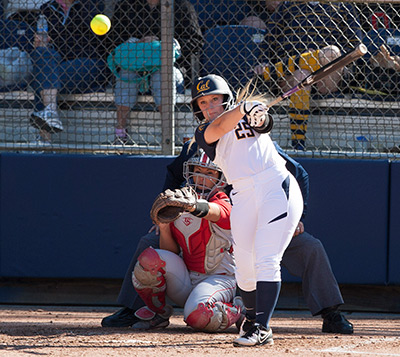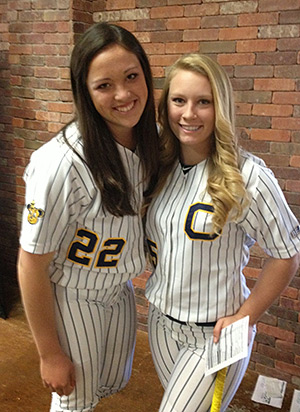Power hitter
On the surface, the late Orlando Tafoya (B.S.’53 ME) and Cal softball player Breana Kostreba may not appear to have much in common. For starters, Tafoya was 80 when he passed away in 2011; Kostreba is a college senior. Tafoya was a track and field athlete; Kostreba hates running. How then, could a man who attended Berkeley in the days of Pappy Waldorf and a 21-year-old young woman for whom the name Pappy is more synonymous with a Telegraph Avenue sports bar, be kindred spirits?
The answer lies in math equations, in efficient and functional designs, and in a passion for engineering rarely matched by a student-athlete. When it came to choosing a recipient for the Orlando Tafoya Memorial Scholarship, Kostreba was the perfect fit.

“It is nice to be able to walk up to a professor and say, “I’m an athlete’ and they say, “Wow — in this major?” says Breana Kostreba. (Photo by Cal Athletics)
A longtime Bay Area sports fan, Tafoya supported the Golden Bears, 49ers and Giants through and through. Wilma, his college sweetheart and wife of 56 years, recalled a time when their house caught fire, and one of his main priorities was securing his 49ers season tickets. He ran track as a freshman in the late 1940s, and one of his greatest memories was competing in the Big Meet at Stanford.
“He didn’t win anything great, but he did earn his letter,” Wilma said. “It was just for the fun of being there competing, running sprints and hurdles.”
After graduation, Orlando Tafoya found a job in aeronautical engineering, working with Douglas Aircraft and Lockheed Martin. He suffered a stroke in 2005.
“Toward the end of his life, we tried to think of all the things that were important to him,” says Wilma. “I knew that engineering was, and he’d loved track and field.” So the Tafoyas — Wilma, son Matthew, and daughters Meg, Julie and Michele — created a scholarship in his name with the same stipulations. Preference would be given to a student in engineering who was interested in sports.
“He would have wanted to share that you can be both an athlete and a professional,” says Wilma.
It goes without saying that admittance into the engineering program is challenging. Within the last three years, less than 15 percent of the College of Engineering’s average of 12,000 annual freshman applicants were admitted. It’s even rarer to find a student-athlete who can manage the time commitment of a demanding engineering major on top of exhausting practices, games and traveling.
Growing up, Kostreba enjoyed designing theme parks with the Roller Coaster Tycoon computer game, made model cars, and once helped her dad build a retaining wall.
“I’ve always enjoyed building stuff,” she says.
At Aptos High School, Kostreba was a two-year member of the Aptos Robotics Club, where her team built underwater robots and qualified for national contests twice. In her senior year, Aptos claimed first place in the international Marine Advance Technology competition held at NASA Johnson Space Center’s Neutral Buoyancy Lab. The team built a model of a remotely operated vehicle, or ROV, that could stop the oil gushing from the 2010 Deepwater Horizon accident, and beat out students from 28 schools and nine different countries.
Kostreba even found her interest in math and science creeping its way into her softball swing, picking up a new style her softball coach suggested based on a double pendulum.
“It was based on physics,” she says. “It made sense to me, and was easier for me to understand than it was for most people.”

GO BEARS: Seniors Breana Kostreba (right) and Mary Lee are the first and second Cal varsity softball players from the College of Engineering, respectively, both majoring in mechanical engineering. (Photo by Breana Kostreba)
Kostreba even based her college entrance essay on the physics of her swing, which was fitting because she could not imagine a college career without softball. She saw Cal as the perfect fit for her journey, ready to rise to the challenge when head softball coach Diane Ninemire told Kostreba that she would be the softball program’s first engineering major.
“I definitely knew that I had a high standard of education for myself compared to other girls that played softball. I saw a lot of situations where athletes weren’t as focused when it came to school; they just didn’t find that as important as I did,” Kostreba says.
On the diamond, she is one of the team’s leading power-hitters, finishing the season batting .324, with five home runs. In the classroom, where she’s pursuing a degree in mechanical engineering, her dedication has earned her the respect of classmates and professors alike.
“My classmates think being a student-athlete and engineering major is cool, but they don’t understand the commitment as much,” Kostreba says. “But it is nice to be able to walk up to a professor and say ‘I’m an athlete’ and they say, ‘Wow — in this major?’ It feels nice to have people respect you, without even knowing you.”
Tafoya’s legacy lives on in Kostreba and keeps her motivated.
“Sometimes it’s tough, and I wish I’d picked an easier major, but in the end I remind myself that it will all pay off. I would not be happy doing something else. My parents have always pushed me to do everything my best,” Kostreba says. “If I had a different major or took the ‘easy’ path — a less time-consuming major — I wouldn’t have been happy. I wouldn’t have been proud.”
An expanded version of this article appeared in the Spring 2014 Cal Sports Quarterly (PDF).
